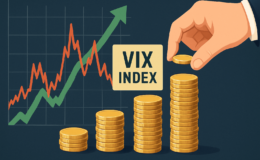How to Ruin Your Investment Portfolio (Part I: Day Trading)
- By : Menard
- Category : Investing
- Tags: Day Trading, Foreign Exchange, How-Not-To

Almost everyone has heard of Aesop’s parable of “The Tortoise and the Hare”. In a nutshell, the story goes like this…
There once was a hare who bragged about how fast he can run. Tired of the hare’s boastful behavior, the tortoise, challenges him to a race. The hare soon leaves the tortoise behind, and confident of winning, takes a nap midway through the race. When the hare awakes, however, he finds that his competitor, crawling slowly but steadily, has won the race!
When it comes to investing, many people act like the hare. To them, investing in a low-cost mutual fund and simply letting your money sit there is too boringly slow like the tortoise. Hare-type investors constantly itch the get-rich-quick feeling of being inside a casino.
So they resort to various risky asset classes, or trading strategies that will likely ruin their portfolios: day trading, buying on margin, short selling, etc. instead of sticking to the proven, slow and steady, dollar-cost averaged, or buy and hold approach to investing.
This series serves as a “How-NOT-to” guide to investing. We’ll cover strategies that you’ll never EVER need to employ to build wealth. Don’t let your broke neighbor, coworker, or brother-in-law convince you otherwise.

Trade frequently like a day trader
Strictly speaking, day trading is not investing. Rather, it’s speculation— buying and selling N number of shares of XYZ, with the aim of making a quick profit. A trader may hold the position from a few seconds to several hours but not to exceed the span of a trading day.
Stocks, bonds, foreign exchange, commodities and various derivative instruments on those, like options or futures contracts, are all perfect asset classes for short-term trading. For starters, they’re very liquid, and prices are highly volatile.
With day trading, you can quickly incur lots of transaction fees. You literally pay a commission for each trade regardless of whether or not you make a profit. You just bought Apple stock at $150 per share, half an hour later, you panic sell at $130 after watching a segment about “Chinese Tariffs” on CNBC. Your online brokerage will love you and your money for this!
Sure, there are discount brokerages offering very low, $4 or $5 trades, or even no transaction fees like Robinhood. But once you’re hooked, you’ll be enticed to borrow money from them to use as leverage. You see, frequent trading requires capital, lots of capital!
Use leverage to amplify profits
I’m obviously not a day trader, but having been a software engineer for two decades now. Half of that was dedicated to developing, designing, and architecting trade and order management systems for foreign exchange.
Foreign exchange, also known as forex, FX or currency trading, is the largest market in the world. In fact, it runs 24/7 all around the world. You can trade USD against EUR, for example, even on Christmas, Easter, Diwali, Eid al-Fitr, you name it. And unlike certain bluechip stocks, no one can predict, I say, ABSOLUTELY NO ONE, where these currencies are headed.
In the forex markets, leverage can be as high as 400:1 using a margin account– cash or securities that can be used as collateral. This means that for every $1,000 in your account, you can trade up to $400,000 in value depending, of course, on the margin requirement set by your broker. That’s the reason many hare-like investors are attracted to trading forex compared to other instruments like stocks.
Leverage, as any savvy investor knows, is a double-edged sword– it can either magnify your profits or your losses! More often than not, it’s the latter– you can lose more than what you initially shelled out (imagine not only losing your shirt but also your underwear) !!! Otherwise, everyone you know who has a brokerage account is now a millionaire.
But let me tell you this, in that very long span of time that I’ve worked, collaborated, interacted, socialized with my bosses, clients, end-users, coworkers, who are all heavily involved in the industry, I’ve never met, heard, or spoke to anyone who got rich from trading currencies!
The ones who got wealthy are the entrepreneurs who made and sold the software. No wonder you see lots of late-night infomercials about people getting ‘rich’ using their special day trading software.

Trade like the Big Boys
There’s nothing wrong with day trading. Fact is, traders are the ones that help provide liquidity to the market. The problem is when the average Joe, like you and me, start day trading, often using money intended for rent or mortgage, thinking that they can perform better than the ones who work at Goldman Sachs, oblivious of the fact that these professional traders are equipped with the latest-and-greatest equipment, expert level know-how and experience.
Think about it: the “Big Boys” will spend gazillion amounts of dollars to drill holes across mountains, so they can set up several miles of perfectly straight fiber optic lines, just to make their high-frequency, algorithmic trades execute— a few milliseconds faster than the competition!
Not to mention access to webs of people who are scattered around the planet ready to give them minute-to-minute updates on virtually anything that can potentially affect their positions.
And yet they still manage to lose money!
If the most skilled and brilliant traders at Goldman Sachs can lose money with all the resources that money can buy, what do you think our chances are??
Day Trading like the “Big Boys” is one of the surest and fastest ways to lose money.

To be continued…
In Part II, we’ll cover Technical Analysis.




No Comments